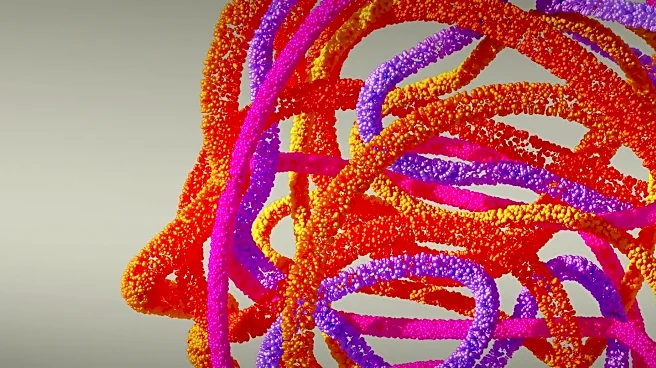What's Happening?
A recent study published in Brain Communications has uncovered the first biological evidence explaining the occurrence of brain fog in individuals suffering from long COVID. Researchers have identified changes in AMPA receptors, which are crucial for brain cell communication and are linked to memory and learning. The study involved PET imaging brain scans of 30 individuals with long COVID, revealing an abnormally high density of AMPA receptors compared to 80 individuals without the condition. This increased receptor activity correlates with the severity of cognitive impairments reported by patients. The study also suggests that COVID infections may provoke an overactive brain immune response, contributing to these changes in receptor levels.
Why It's Important?
The findings of this study are significant as they provide a potential target for developing treatments for long COVID brain fog, a condition affecting a substantial number of COVID-19 survivors. By understanding the role of AMPA receptors and the immune response in cognitive impairments, healthcare professionals may be able to devise strategies to alleviate symptoms. This research could lead to the prescription of drugs that block AMPA receptor activity, offering relief to those experiencing persistent brain fog. Recognizing long COVID brain fog as a legitimate clinical condition may also accelerate the development of diagnostic and therapeutic approaches, benefiting patients and the healthcare industry.
What's Next?
While the study does not propose a new treatment, it offers guidance for future research and potential therapeutic targets. Scientists may focus on developing drugs that modulate AMPA receptor activity to reduce brain fog symptoms. Further studies are needed to explore the relationship between COVID infections and AMPA receptor changes, as well as the role of chronic inflammation in cognitive impairments. The healthcare industry may prioritize the development of diagnostic tools and treatments for long COVID brain fog, potentially improving the quality of life for affected individuals.
Beyond the Headlines
The study highlights the complex interplay between neural pathways and immune responses in sensory perception, offering insights into the broader implications of COVID-19 on brain health. Understanding these mechanisms may contribute to advancements in treating other sensory disorders and cognitive impairments. The research underscores the importance of recognizing long COVID as a multifaceted condition with diverse symptoms, necessitating a comprehensive approach to diagnosis and treatment.









